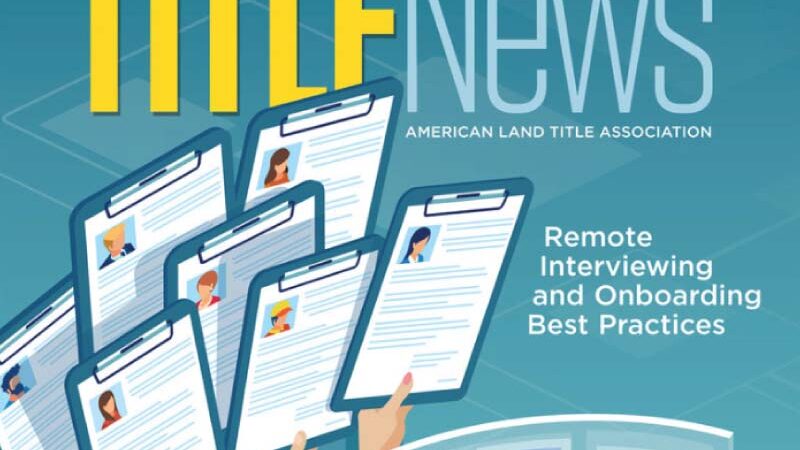Remote Interviewing and Onboarding Best Practices
WITH MANY COMPANIES making COVID-19 vaccinations mandatory, a substantial number of workers began returning to the office in the last few months of 2021. By Dec. 1, office occupancy nationally edged to about 40%, according to Peter Miscovich, New York City-based managing director of commercial real estate services firm JLL.
When the omicron variant began sweeping the nation, companies once again delayed office returns and sent workers home. Security service provider Kastle reported that average physical office occupancy in the 10 U.S. cities it tracks went from 39.8% the week of Dec. 8 to 17.5% the week of Dec. 29. This could mean continued hybrid or remote work for the title insurance and settlement services industry as business shifts to a purchase-dominated market. Pandemic or no pandemic, organizations still need to retain new employees as the year progresses. Companies will need to ensure they have the proper procedures in place to successfully conduct remote interviews and onboard employees after making the hire.
If a company has identified it’s ready to hire, the first thing to address is having a concrete job description that outlines expectations and qualities for the position, according to Jennifer Luedtke, human resources manager for Wisconsin-based Town n’ Country Title. ALTA’s Title & Settlement Services Industry Compensation Index can be used to help ensure compensation packages are aligned with what’s offered in the market.
“Then you’re going to want to identify your hiring team that will assist throughout the process and help identify the best candidate out of the pool of applicants,” Luedtke said.
Job Postings
To find potential prospects, businesses will want to post job openings on various venues, including job search engines, social media platforms and company websites.
Online Job Search Engines
- Indeed
- Monster
- ZipRecruiter
- State-specific workforce development sites
Social Media Platforms
Luedtke recommends having a career page on your company website.
“You can post job openings or just let people submit their names and resumes throughout the year, in case you’re not sure when you may have a position that’s open,” she said. “Then you’ll have a flow of applicants interested in your company.”
Several operations have created referral programs where current employees are rewarded for helping identify quality candidates. Companies could also encourage staff to share social media posts on their own network.
“Your employees know the position that needs to be filled or may work in the same office,” Luedtke said. “It’s a great way to engage your team members and to be part of the hiring process,” Luedtke said.
Remote Interviewing
After identifying an applicant pool, it’s important to review each one because you don’t want to accidentally skip over someone who could be a perfect fit.
Luedtke starts with phone interviews. She contacts the candidates by email. “Secretly, this helps me gauge their communications style, and I can see if they respond professionally,” Luedtke said.
During the phone interview, Luedtke asks basic questions about strengths and weaknesses, what they are looking for in their next role. She also asks candidates to walk through their resumes.
“You can really easily gauge through a 20- to 30-minute phone conversation how engaged they are or if they can speak professionally,” Luedtke said.
From there, Town n’ Country holds video interviews with the top candidates. Common platforms are Go-To Meeting, Zoom, Skype and Microsoft Teams. Using a collaboration tool that enables multiple participants allows the hiring team to get involved in the interviewing process. In addition to interviews, some companies use personality tests to identify if candidates fit a particular role. After you’ve done the in-person or video interviews, some companies choose to do a personality test.
“Building a candidate profile is something that would be really important to the process,” Luedtke said. “You can teach someone how to do the job, but what’s important is to identify if they fit within your company culture and have characteristics that would make them successful in the position.”
Common personality testing platforms include DiSC, Acumax, Myers-Briggs, Predictive Index and Enneagram. Prices range from free to about $150. Connecting the hiring team on a video platform is important to keep everyone involved. With people scattered across a state or round the country, investing in a video conferencing platform is an easy way to keep connected.
“A few things to remember when conducting video interviews is to be personable and smile,” Luedtke said. “This will help make the applicant feel more comfortable and relaxed, because watching themselves on screen can honestly be just as stressful as being in front of you.”
Let the candidate know you don’t care what’s behind them, whether it’s a kitchen window or the wall of a spare bedroom. It’s more important to pay attention to engagement and see if they’re professional.

